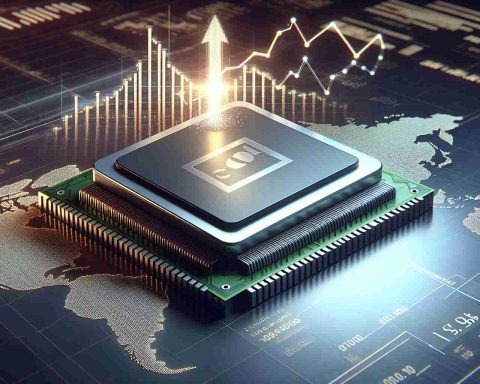The race for technological supremacy has taken a new turn. US President Donald Trump has made a monumental move by announcing a partnership with significant tech players to funnel billions into artificial intelligence (AI).
In a strategic effort to enhance America’s position in AI development, Trump unveiled a collaborative initiative known as Stargate, which includes major companies such as OpenAI, Oracle, and Softbank. This ambitious project, revealed during a White House event with prominent tech leaders, sets aside an initial $100 billion and plans to escalate investment up to $500 billion over four years. Excitingly, more tech titans, including Microsoft and Nvidia, are expected to join the venture.
While this investment promises significant advancements, it also raises questions about sustainability. Experts warn that the rapid expansion of data centers needed for AI could overwhelm local power systems. Unlike previous administrations that advocated for renewable energy, Trump’s focus appears geared towards boosting fossil fuel production to support this technological surge.
Following the news, stock markets reacted positively, with tech shares experiencing remarkable gains. Oracle’s stock jumped by 7.2%, while Softbank saw a 9.3% increase. In contrast, European tech stocks faced mixed outcomes, reflecting the differing strategies in AI policy and regulation on either side of the Atlantic.
As the potential of this investment unfolds, the implications for global energy prices remain uncertain, with recent trends pointing downwards amid expectations of an increase in US energy production.
The Ripple Effect of the Stargate AI Initiative
The launch of the Stargate initiative fundamentally alters the landscape of technological competition, with implications extending far beyond national borders. In an era increasingly defined by digital capabilities, the US’s aggressive push into AI development will inevitably shift economic power dynamics globally. Countries that lag in AI deployment may find themselves at a competitive disadvantage, potentially widening the existing tech gap between the United States and other nations.
Moreover, the rush to command AI supremacy can strain societal structures. Increased automation threatens to disrupt labor markets, prompting concerns about job displacement and the future of work. As skilled jobs in traditional sectors become obsolete, governments worldwide are called to rethink educational and social safety nets, underscoring the urgent need for upskilling and reskilling initiatives.
On an environmental front, the projected expansion of data centers to support AI growth poses significant challenges. These facilities often consume vast amounts of energy, contributing to heightened carbon footprints unless balanced by sustainable practices. Addressing this issue becomes imperative as global stakeholders grapple with climate change, forcing a reevaluation of how technology and sustainability intersect.
As we peer into future trends, the evolving landscape may usher in new regulatory frameworks, advocating for responsible AI integration that addresses ethical considerations. The long-term significance of such initiatives stretches into geopolitics, economics, and environmental sustainability, demanding a holistic approach to technology’s integration into society.
AI Revolution: How Stargate is Positioned to Transform the Tech Landscape
Introduction to the Stargate Initiative
In a bold strategic maneuver, the United States has embarked on a groundbreaking initiative aimed at technological superiority in artificial intelligence (AI). The ‘Stargate’ project, announced by former President Donald Trump, seeks to leverage significant investments from major tech players to accelerate AI development. With an initial commitment of $100 billion to potentially reach $500 billion over the next four years, this initiative stands poised to reshape the landscape of AI and technology.
Key Features of the Stargate Initiative
1. Collaboration with Major Tech Firms: Stargate brings together industry giants such as OpenAI, Oracle, Softbank, Microsoft, and Nvidia. This diversified coalition aims to pool resources and expertise, facilitating rapid advancements in AI technologies.
2. Substantial Financial Commitment: The strategic allocation of funds is unprecedented, marking one of the largest investments in AI development. This sets the stage for a wave of innovations across multiple sectors.
3. Focus on Infrastructure: The initiative emphasizes the need for robust data centers to support AI applications. This may lead to significant advancements in cloud computing and data processing capabilities.
Pros and Cons of the Stargate Initiative
Pros:
– Economic Growth: The investment is set to create thousands of jobs, stimulating economic growth within the tech sector.
– Innovation Acceleration: Faster advancements in AI could lead to breakthroughs in various fields such as healthcare, finance, and manufacturing.
Cons:
– Environmental Concerns: The reliance on fossil fuels to support increased power demands raises sustainability issues, potentially undermining efforts to combat climate change.
– Energy Infrastructure Strain: The rapid expansion of data centers could overwhelm existing power grids, necessitating significant infrastructure upgrades.
Trends and Predictions
The launch of Stargate comes at a time when global interest in AI technologies is surging. Analysts predict that as investments surge, we may witness a new wave of AI-driven applications that enhance productivity across industries. According to market forecasts, sectors such as healthcare and automotive could see transformative changes, with AI playing a central role in innovation.
Security Aspects in AI Development
As the Stargate initiative aims to push the boundaries of AI technology, cybersecurity remains a crucial consideration. The integration of AI in critical sectors could expose new vulnerabilities, necessitating robust security protocols to safeguard sensitive data and infrastructure from potential threats.
Conclusion: A Game-Changer for AI Development
The Stargate initiative represents a significant turning point in the race for AI supremacy. As the project unfolds, it will be essential to monitor its implications on global tech markets, environmental sustainability, and energy consumption. With the potential for major innovations on the horizon, stakeholders across industries will be keenly watching the developments driven by this ambitious investment.
For further insights on AI and technology trends, visit TechCrunch.

















